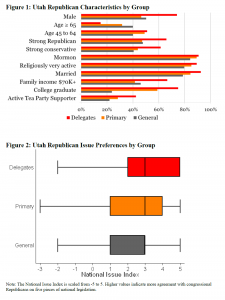Matthew Frei and Dr. J. Quin Monson, Department of Political Science
When Senator Robert Bennett was defeated in the 2010 Republican state nominating convention, many political observers suggested that Utah’s nomination system gives too much power to convention delegates who nominate candidates who do not well represent most Utahns. My ORCA research addresses these concerns by accessing the representativeness of Utah’s candidate nomination system.
I presented the following findings at the 2010 annual conference of the Midwestern Political Science Association in Chicago, Illinois. Then, I won the Best Poster in Political Science award at the 2011 BYU Fulton Mentored Student Research Conference. Finally, I also incorporated this research into a coauthored book chapter about the influence of the Tea Party Movement in the 2010 Utah senatorial election1.
The first goal of my research was to determine the extent to which Republican nominating convention delegates share characteristics with primary and general election voters. I worked with my mentor and other faculty members to design surveys that we administered to 2010 Republican nominating convention delegates and to Republicans who voted in that year’s primary and general elections. We found that Republican delegates differ from mainstream GOP voters in significant ways. As Figure 1 demonstrates, they are much more likely to be young, male, strongly partisan, extremely conservative, and supportive of the Tea Party movement than primary or general election Republicans. Further, they are more likely to be married, well educated, and have more income.
After determining that Republican delegates differ from other Republicans in important ways, I compared the issue preferences of the groups to determine how well Republican delegates represent the opinions of others in their party. We asked respondents to the same three surveys whether they favored or opposed five pieces of legislation: the reauthorization of the State Children’s Health Insurance Program, the 2009 stimulus package, health insurance reform, the 2008 Troubled Asset Relief Package, and funding for an increase of troops in Afghanistan. From their responses, I constructed an index ranging from -5 to 5 with higher scores indicating more agreement with congressional Republicans. Figure 2 shows that Republican delegates tend to have considerably higher index scores than others in their party. More sophisticated analyses (not shown) indicate that this effect persist in the presence of demographic control variables.
These results suggest that Republican delegates are demographically and substantively different from other Republicans. These differences could lead to the nomination of candidates who would not draw the support of a majority of primary voters.
References
- Matthew D. Frei, J. Quin Monson, Leah Murray, and Kelly D. Patterson. “Tea for Only Two: The Ousting of Utah Senator Robert Bennett” in Tea Party Effects on 2010 U.S. Senate Elections: Stuck in the Middle to Lose. Lanham, MD: Lexington Books, 2011.

